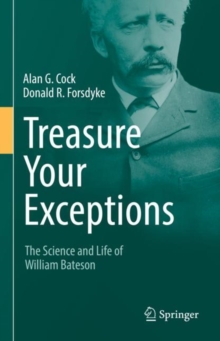William Bateson brought the work of Mendel (and much more) to the attention of the English-speaking world.
He commanded the biological sciences in the decades after Darwin's death in 1882.
To understand these years we must first understand Bateson.
Through examination of the life of a major contributor to the turn-of-the-nineteenth-century revolution in biology, the authors reconcile the genocentrism of George Williams and Richard Dawkins with the hierarchical thinking of Richard Goldschmidt and Stephen Jay Gould.
Aided by Rebecca Saunders, Bateson invented much of the basic terminology of modern genetics and, when addressing Darwin's great problem – the origin of species, introduced the mysterious term "the residue." While the first edition of this work (2008) related "residue" to relative concentrations of bases in DNA, the second edition reveals this as reflecting fundamental differences in short strings of bases.
Thus, the book has come to represent not only Bateson’s science and life, but also a revised history of the biosciences that is likely to be increasingly visited, both by scientists and by those who wish to fully understand contemporary debates on racial, eugenic and gender aspects of genetics.
In a nutshell, the book describes what we, in modern terms, would call a "colossal intelligence failure." Mendel handed it to us "on a plate" in 1865 when Bateson was only 4.
It took 35 years to "join the dots" with Bateson a primary joiner.
Shrugged off by many 20th century scientists as a freak "blip" in what was really an orderly advance, the Mendel episode was but one of a succession of such "blips." Thus, a multiplicity of post-Mendelian "Mendels" emerge as the story of Bateson's life unfolds. Peter Harper in Human Genetics (2009): "This book puts the record straight and one is left with a feeling of admiration for Bateson as both a scientist and a man, and with no doubt that he, more than anyone else, was largely responsible for the rapid progress in modern genetics during the first decade of the twentieth century."Michael J.
Wade in Evolution (2009): "I strongly recommend this book for its information on an important central figure and for its bringing to life the several controversies at the origins of Genetics.
It greatly illuminates the conceptual foundations of evolutionary genetics."Elof Axel Carlson in Quarterly Review of Biology (2009): "This volume will be of enormous benefit to historians of science who like to follow how ideas are born or die and why participants of different sides of each controversy held such rigid views of their own work and saw little merit in their competitor’s research."Joel S.
Schwartz in Choice (2009): "This work includes key events in Bateson's career and is strengthened by discussion of the rediscovery of Mendelian principles by early 20th-century geneticists.
Its basic premise isthat Bateson was not merely one of the founders of genetics but played a pivotal role in the development of evolutionary biology by serving as the link between Victorian naturalists and early 20th-century biologists."Amitabh Joshi in Journal of Genetics (2010): "There is much in this book that I was not aware of, despite a formal training in genetics and a strong amateur interest in the history of biology.… It is certainly a book that any serious student of either genetics or evolution would greatly benefit from reading."


